Disclosure: Meeple Mountain received a free copy of this product in exchange for an honest, unbiased review. This review is not intended to be an endorsement.
This is my first Rising game.
For those unfamiliar, the Rising series is a cooperative game using a variety of popular intellectual properties. The first one was Thanos Rising, based on the Marvel Cinematic Universe, followed by other licenses like Star Wars, Harry Potter, and…Spongebob? Okay, sure, why not.
Even though I am not the biggest fan of cooperative games, this grabbed my attention because I like Batman, and according to the community, this is the hardest version out of the series. As for the long game title, it is a lengthy story. To sum it up, this is an alternative universe where Batman kills the Joker and gets exposed to toxins. This toxin transforms Bruce Wayne, gradually ripping pieces of his mind and body. As a result of this shift, this is a Batman with Bruce Wayne’s intellect combined with Joker’s lack of values.
Since comics love the silly multi-universe nonsense, the story of this game follows the same direction. The Batman Who Laughs seeks to conquer the Prime Universe, and he is bringing his party bus full of villains along for the ride. You and your friends will lead their own team of heroes to stop this threat by defeating villains and recruiting heroes until The Batman Who Laughs shows up for the final showdown.
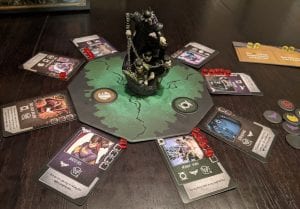
Meanwhile at the Hall Of Justice
Everyone will choose a team with their own abilities, dice pool, and leaders, such as Wonder Woman and ‘traditional’ Batman. At the center of the playing space is a tile that shows the three numbered locations with three cards face up at each location. Sitting in the middle of this tile is a figure of The Batman Who Laughs with three little Evil Robins chained up. The purpose behind this beautiful production? It’s just there to tell you what area he is attacking. While I would usually scold a game for going overboard for this simple function, I can’t ignore the quality. It’s an incredible piece of art, and the chain itself is a legitimate metal chain that swings around. Overblown plastic is one of the many notable characteristics of the Rising series.
Another feature of the series is the simplicity of the gameplay. Each turn, you choose one of three locations to engage. Once selected, you roll dice to determine how many counters you will add to the Dark Knight track, and which locations The Batman Who Laughs will attack. If the Dark Knight track is full of counters, you lose. As you advance on the track, more villains will appear, and new harmful effects will occur with a 50% chance of triggering.
Each location will have three cards from the deck consisting of heroes and villains. If the location is under attack, all heroes, including the members of your team if that’s the location you chose, will suffer one point of damage. This location will also trigger the abilities of any villains in the area, often hitting heroes again. When a hero’s health is zero at the end of your turn, you must discard it. This can lead to two more failure states. One is if ten or more heroes are defeated, and the other is when one player has no heroes left on their team.
Once that is done, it’s time to roll the dice. Your starting dice pool is dependent on your team and your cast of heroes. Roll the dice and assign one or more dice to each hero and villain according to the card symbols. If you cannot do this, discard one die. After assigning or discarding, roll again. You continue to roll dice until you can’t. That’s your turn.
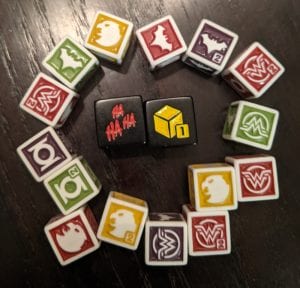
Mastering the Bat-Roll
Pretty easy stuff. After playing this a few times, I can see why this system gets back-to-back licensing. It’s a basic ruleset that can be taught within minutes to even the greenest of gamers.
Besides the simplicity, I enjoy the idea of recruiting heroes from these locations. Each hero has an ability that either you gain passively or require you to roll specific symbols to activate. Essentially, you are buying tools with a small dosage of violence, much like a Black Friday stampede without anyone searching for a Will before lunch.
In contrast to the heroes, the villains act as a speed bump that you cannot ignore. Most of these villain powers do little more than add damage, while others are mean. How mean? Attacking all heroes in an adjacent location, damaging the active player’s entire roster, or having The Batman Who Laughs roll the dice to strike again. The list goes on.
All the dice rolling, heroes drafting, villains attacking, and card drawing creates a delicious stew that you and your friends can savor. It’s also one of the few forms of co-op that I can tolerate. Instead of a game dictated by deterministic systems, it is the randomized elements that fuel the tension.
I prefer this because it fixes the issue I have with most co-op games: The Alpha Player. It’s a piece of criticism that might as well be a meme at this point, but it is a hill I will die on despite the high body count. If a cooperative game includes multiple deterministic components, the veteran player will be the one to solve the mystery. It frequently leads to a decision space that echoes the same vibe as a Zoom meeting. You are no longer engaging in the game’s mechanisms; you are going on a guided tour.
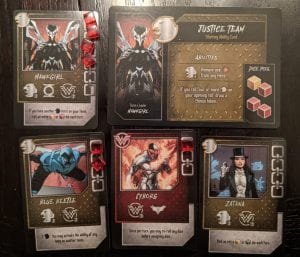
No I in Team
Since dice play a significant role, the Alpha Player cannot strangle the life out of the discussion. It’s hard to come up with the perfect plan when you don’t know the outcome. It steers the conversation towards prioritization and risk management instead of conjuring a step-by-step solution.
Besides reducing the influence of the Alpha Player, it also submerges everyone into the theme. This is a game about superheroes protecting the earth from dimension traveling supervillains. It’s Greek Mythology with the helping of science fiction. Because of these foundations, it makes sense that the implied game narrative is an untamed beast. The unpredictable nature pushes the waves of triumphs and failures for your friends to surf on.
However, this lack of care for structure does come at a price. As someone with a bit of experience with challenging cooperative games like Bloc by Bloc and Spirit Island, this game does hit the mark for the most part. It’s the other part that can be a little frustrating.
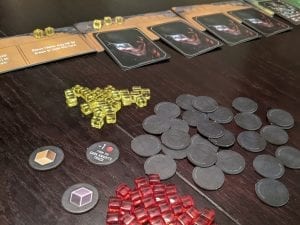
All Stories Begin in Darkness
One quick look at the leader cards foreshadows this. You start with four dice in your pool, and your leader will only give you an additional die if you recruit a hero with a specific type. Think hero types like a suit in a standard deck of playing cards. The issue props itself up when you don’t see that hero you need, or whatever is available has a cost that is impossible to obtain with your four dice pool. Your only options are to recruit someone else, which will likely not increase your dice pool or damage a villain. Damaging a villain gives your team a random bonus token with a bountiful effect, but those powers are one-time use. That’s just one piece of this enormous puzzle.
This is not to say that winning the game is impossible. Out of the handful of times I’ve played this game, I did beat the game once. I had to continually interrogate the situation I was in and scrutinize every detail to determine that whatever move I attempted wasn’t just the right one, but one with a high chance of success. While all of this sounds good, I need to point out that you will sometimes lose due to circumstances beyond your control like the wind’s direction during a sailing trip.
Does this make the game bad? Not at all. It can be as frustrating as finding out your toddler used permanent markers on the walls, but you can’t stay mad forever. It’s about taking risks and plunging into hopeless situations to get the job done, as one would expect in a superhero game. With its easy rules, it is something that anyone can get into, but with the grueling difficulty that few will appreciate.
You can purchase a copy of The Batman Who Laughs Rising at Amazon.com


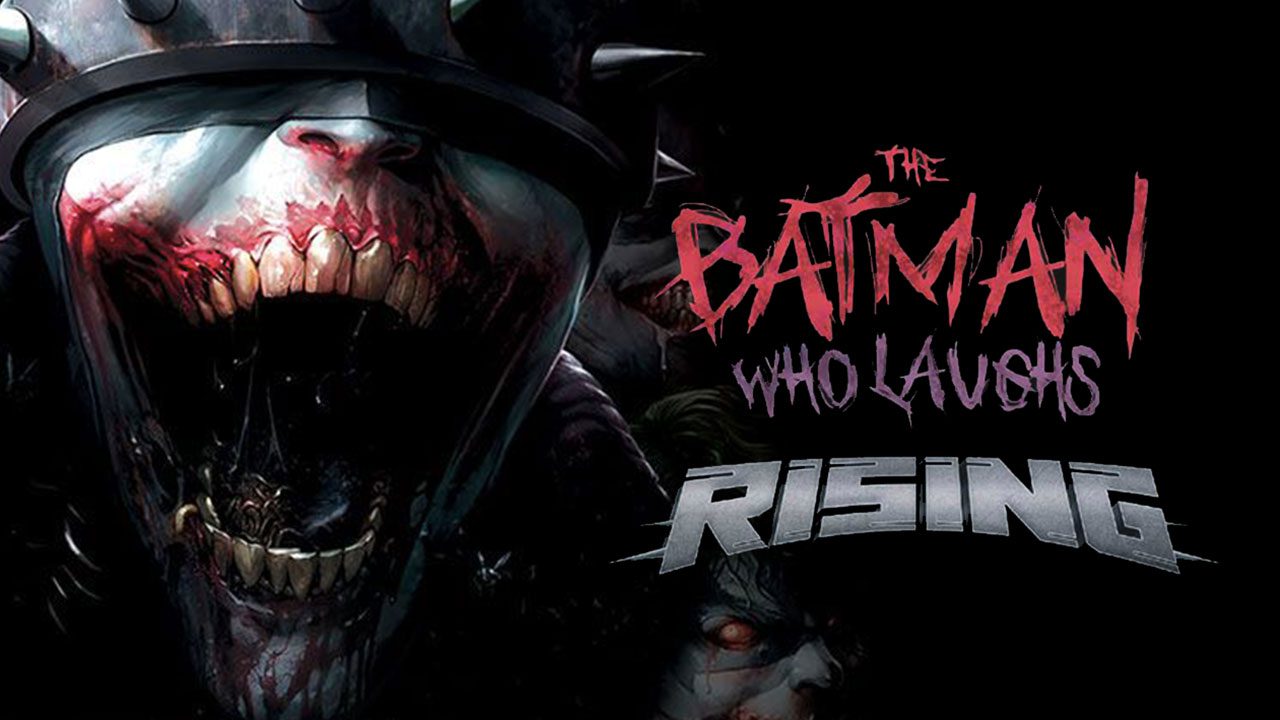

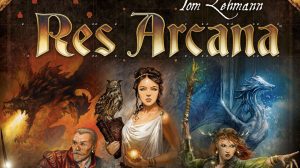


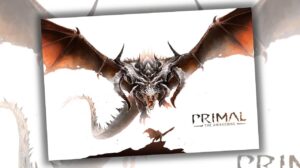




Add Comment